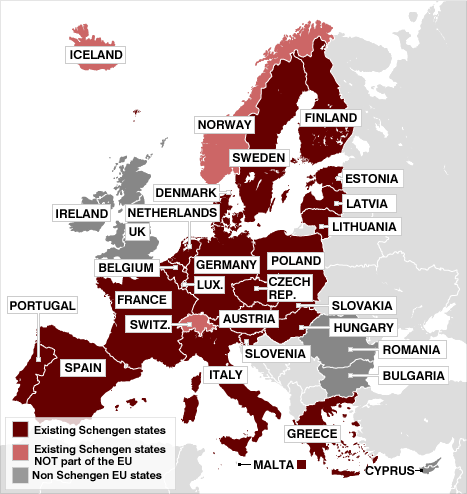Introduction to Visa Relations
The terms «Schengen area» and «Schengen visa» are familiar to every Belarusian. Before the First World War there was no requirement to have a passport if you wished to travel across Europe; from Paris to Vitebsk. Now for many Belarusians, a borderless Europe, which is a reality for 400 million Europeans with its ease of travel and greater contact between communities, is just a dream. However, it is a dream that one day can come true.
Currently, the Schengen Area encompasses territories of 25 European states and resembles a unified state with eliminated border controls within the area and with enhanced border controls with non-member states. The Schengen Agreement was initially signed in 1985 and created a borderless zone of free movement of people and goods. The Schengen area now includes 22 EU member states (with the exception of Ireland, the United Kingdom, Bulgaria, Romania, and Cyprus) and 3 non-members of the EU (Iceland, Switzerland, and Norway).
The implementation of the Schengen Agreement by the participating countries has gone hand in hand with efforts to create a zone of enhanced security and efficiency through an external border regime. For this reason, the Schengen states have undergone a process of harmonization of policies and administrative procedures in a number of relevant policy areas, such as visa and immigration policy, judicial cooperation, and cross-border policing. In July 2009 to make the necessary amendments in visa procedure for Schengen states, the Visa Code was introduced by a common decision of the European Parliament and the Council. The Visa Code enhanced transparency of visa issuance procedures, recast the visa legislation of Schengen states and introduced a legal framework for the facilitation of visa applications. Currently the Visa Code is regulating visa issues between the Schengen countries and third countries.
Meanwhile, to prevent the emergence of dividing lines between the EU and neighbouring countries, a visa facilitation process has been initiated. Visa facilitation is a simplification of visa issuing procedures for nationals of third countries who are under visa obligation. The purpose of visa facilitation agreements is to promote interaction between the citizens of the European Union and those of contracting States. As regards the decision to open visa facilitation negotiations with third countries, the common approach is based on a case by case assessment of third countries, while taking into account the EU’s overall relationship with candidate countries, countries with a European perspective and countries covered by the European Neighbourhood Policy as well as strategic partners. The merits of the case of each country must be assessed individually. Since the «big-bang» enlargement of 2004, the EU has concluded Visa Facilitation Agreements with the Russian Federation (June 2007), Ukraine, Albania, the Former Yugoslav Republic of Macedonia, Serbia, Montenegro, Bosnia and Herzegovina, and the Republic of Moldova (January 2008), and Georgia (June 2010). In March 2011 the Council of the European Union authorised the European Commission to begin talks on visa facilitation and readmission agreements between the EU and Belarus.
The ultimate goal of the visa facilitation process is visa liberalisation — the abolition of visa requirements for the third country nationals willing to enter the Schengen zone. However, there are a number of requirements that a third country should meet to obtain such preferences. When the visa facilitation process starts, the roadmap for actions in the third country is outlined and usually includes a number of benchmarks to assess progress.
Within the visa facilitation process, a priority for the EU is the conclusion of a Readmission Agreement — an agreement between the EU and a third country pertaining to the readmission of persons who do not, or no longer, meet the conditions of presence or residence on the territory of one of the two parties and are (a) nationals of the other party or (b) nationals of a third country, but have transited through the other party’s territory. In practice, readmission agreements facilitate the expulsion of illegal residents to their country of origin or transit and are part of the EU’s strategy to combat illegal migration. However, the existence of such an agreement between the EU and the third country or the willingness to negotiate one does not automatically lead to the opening of negotiations on a visa facilitation agreement. Often other security concerns are taken into consideration. The content of a visa facilitation agreement varies on a case by case basis, depending on the visa policy of a third country, the existence or preparedness to issue biometric passports, political and security concerns. Negotiations on a Visa Facilitation Agreement between the EC and the country concerned are generally based on the principle of reciprocity.
The example of the Western Balkan states is very impressive. Visa requirements for the Former Yugoslav Republic of Macedonia, Montenegro, and Serbia were abolished in December 2009, while Albania and Bosnia and Herzegovina received the same preferences in December 2010. As the experience of the Western Balkan states shows, among the most influential factors for the success of the visa facilitation process are the political will for putting the visa reforms on the top of the political agenda, competency of the government to implement reforms, and consensus among political actors.
Belarus has not started negotiations on a Visa Facilitation Agreement yet. The EU’s visa policy vis-à-vis Belarusian citizens is regulated by the EU Visa Code. Unlike the citizens of the countries that have already signed Visa Facilitation Agreements with the EU (such as Russia, Ukraine, Moldova and Georgia) who are entitled to pay 35 euros for a Schengen visa, Belarusians are still paying 60 euros to obtain one. In 2011 the mandate for the beginning of the negotiations on the Visa Facilitation Agreement between the EC and Belarus has been passed to the Belarusian authorities who are expected to present their decision soon.
























